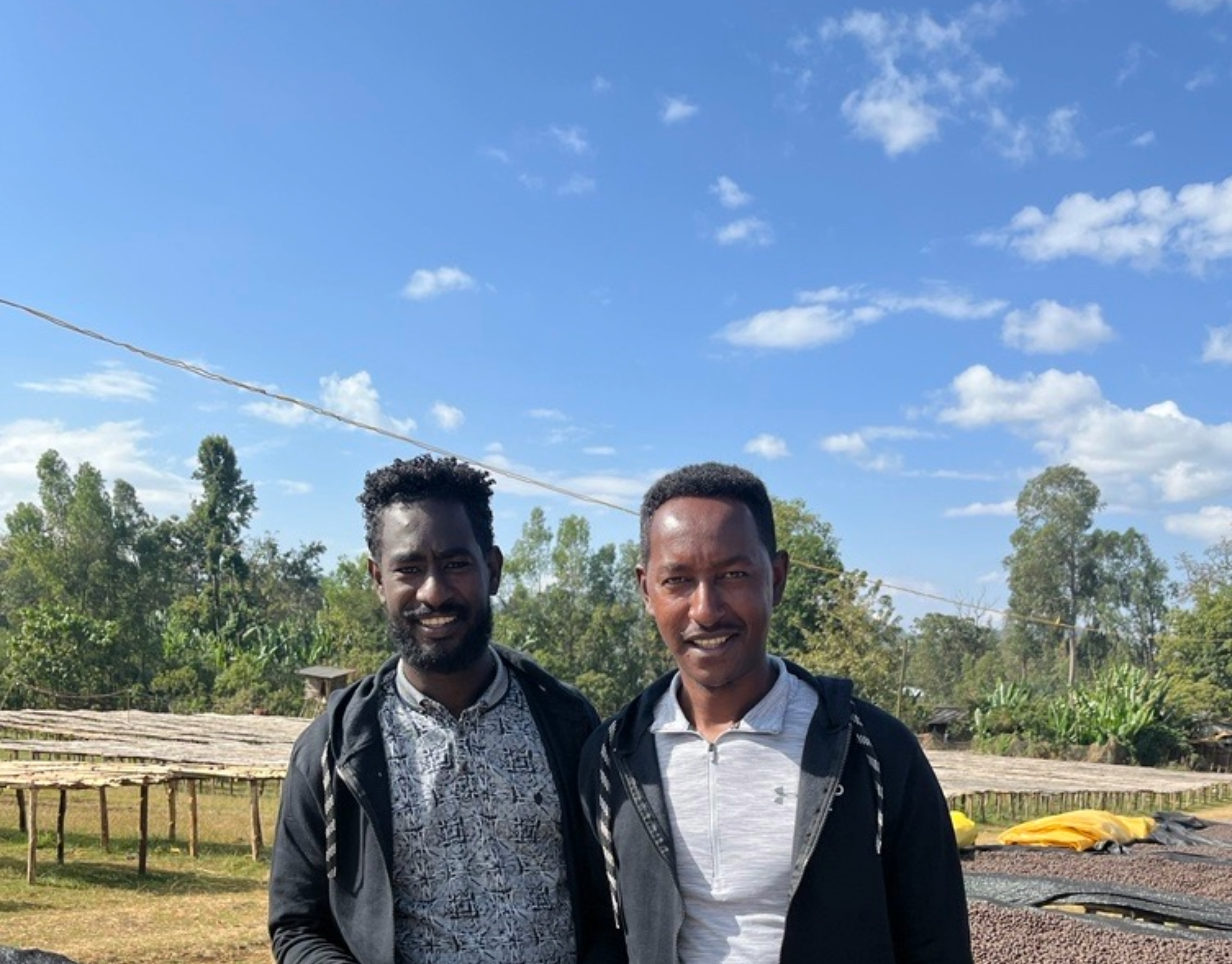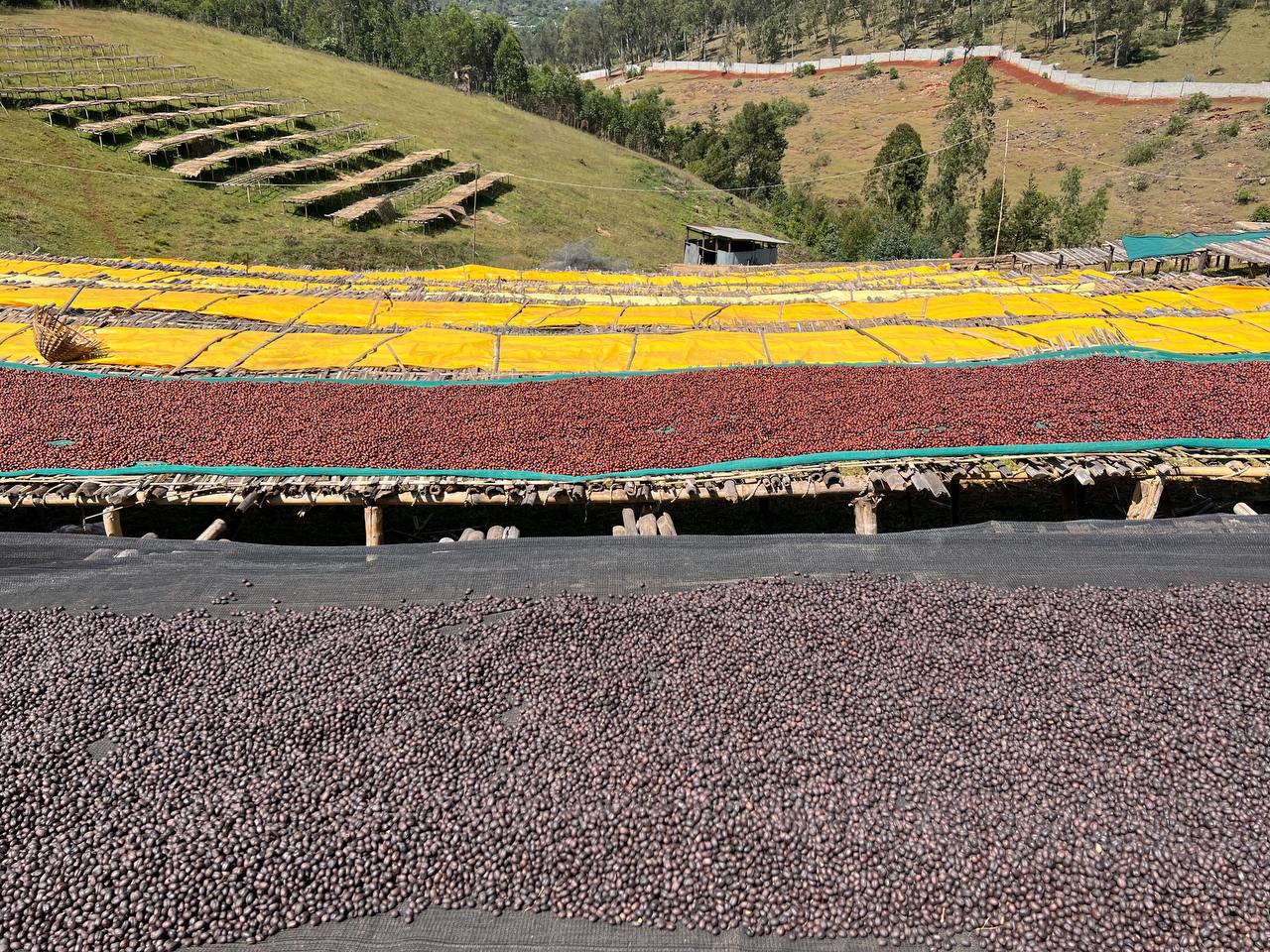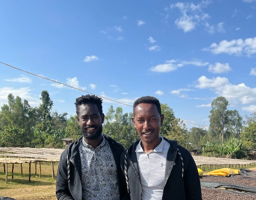Pick your crop :
Aromatic notes:
Spot price
€/kg
About this coffee
This year's 2023 crop was dried on 120 African beds. To control the drying of the cherries, two people are assigned full time to each bed. Depending on the weather, the drying time can vary from 18 to 22 days. The dried coffee is then transported in jute bags to a warehouse at the washing station for storage on pallets. When the station's warehouse reaches its maximum capacity (usually within three days at the harvest peak), the coffee is transferred to a larger warehouse in the Woreda (district) of Bensa.
Social impact
DWD is currently running a project in partnership with the regional government office to open a secondary school in this area next year.
Environmental impact
This coffee is natural processed and does not require water in its preparation.
A wide variety of trees overhang the plantations such as Grawa, Bisana, Wanza, Koso, Dokma, Kerkaha, Kerero, Birbirsa, Popocarpus falcatus, Tsid, Zembaba...
Marketing tools & Certifications
POS displays, postcards, QR codes for packaging, ...
The farm Chancho
Chancho is one of the latest washing station to be opened by DWD. It is spread over 3 hectares and started operating in 2021. The station is located in the Sidama region, Bensa Woreda, and near the kebele (village) Gemecho, 12 km from the main road. With an altitude of 2300-2400 meters, this climate offers ideal growing conditions for coffee. The harvest season lasts from November to February.
Highly skilled teams sort the cherries on the drying beds as soon as they arrive. The coffee is harvested from 500 to 700 farmers. DWD helps them to add value to this production by providing them with seeds, offering them advance payments and training to encourage them to be hyper-selective in their harvesting.
The Chancho washing station has the advantage of being located in the centre of a coffee growing area, which allows them to easily deliver their cherries. They transport the coffee by donkey or horse so that the quality of the cherries is not affected by the smoke from the engines.
The second advantage is that the coffee collected has exact traceability to the Sidama appellation.
A wide variety of trees overhang the plantations such as Grawa, Bisana, Wanza, Koso, Dokma, Kerkaha, Kerero, Birbirsa, Popocarpus falcatus, Tsid, Zembaba...
Environment
Forest

Meet DWD
A few words about DWD
Ato Dukale was born near Bensa, in the Sidama region, where his parents already had a coffee farm. Very quickly, his interest turned to coffee. He spent a long time travelling around his native region to collect his first bags from the various Sidama farmers. In the late 1980s, Ato Dukale built his first washing station in Daye Bensa, which he called "Awraja and his family." Awraja was the name of the department where he grew up. It was also Ato Dukale's nickname when he was a renowned volleyball player and travelled the country with his team, under the colours of his district: Bensa Awraja!
Since then, his business has flourished, and Dukale Wakayo Dakola (DWD) now has 16 collection centres in the Sidama and Yirgacheffe regions. It has been taken over by Ato Dukale's sons, Assafa, Shahsamo and Yamrot, who, along with their father, put all their energy into producing quality coffees.
Analyzed to the nearest gram
Find detailed physical and sensory analyzes of your coffee in the quality sheet with:
- Density
- The humidity level
- Water activity
- Colorimetry
- The sieve
- The nature of the defects
- The score and its details
- The aromatic profile (downloadable)
Coffees of DWD


Equipments selection
Unit price
€ ex.tax/U
From xx products
€ ex.tax/U
Unit price
€ ex.tax/U
From xx products
€ ex.tax/U
Unit price
€ ex.tax/U
From xx products
€ ex.tax/U
Unit price
€ ex.tax/U
From xx products
€ ex.tax/U
Unit price
€ ex.tax/U
From xx products
€ ex.tax/U
Unit price
€ ex.tax/U
From xx products
€ ex.tax/U
Unit price
€ ex.tax/U
From xx products
€ ex.tax/U

